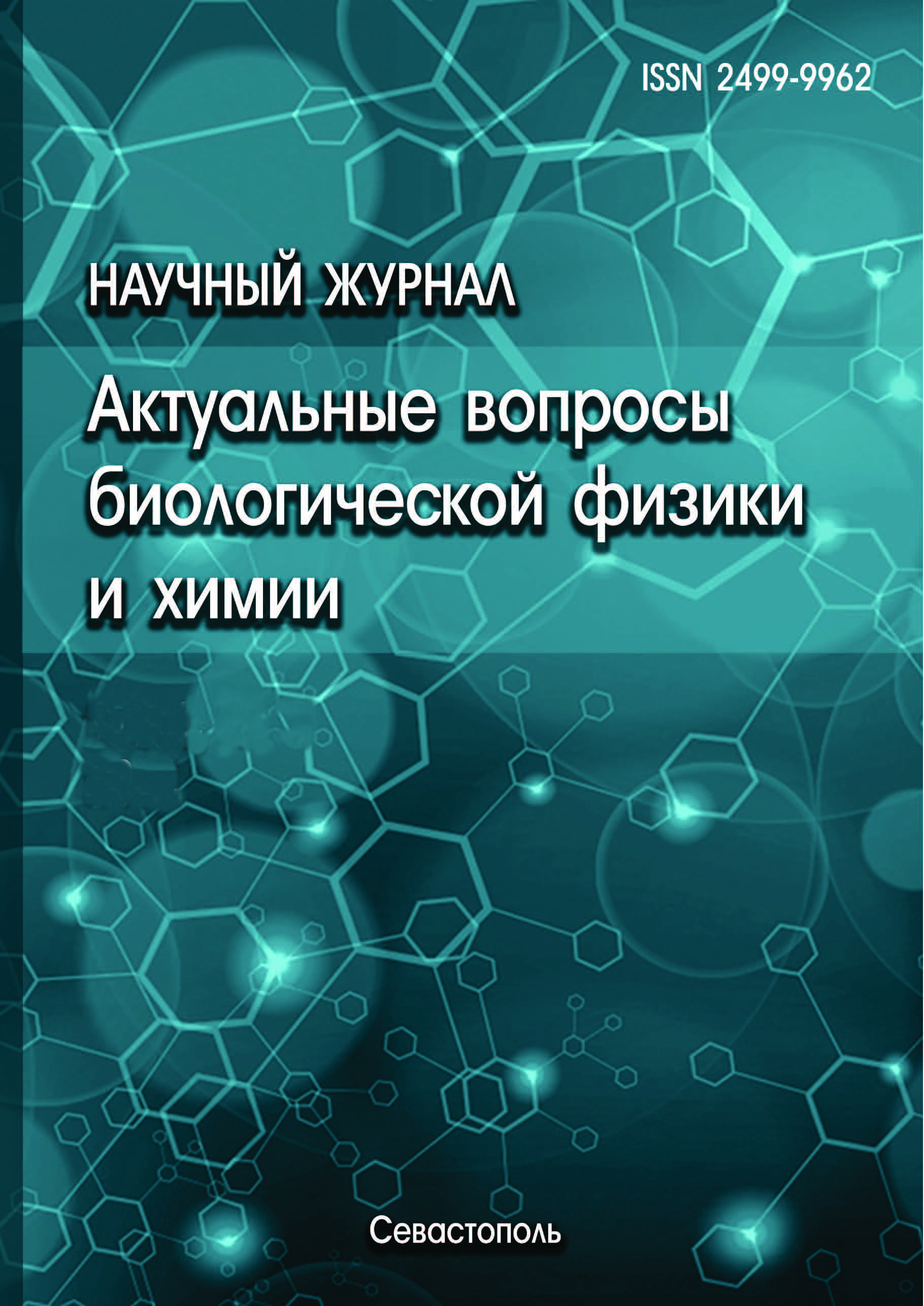Sevastopol, Sevastopol, Russian Federation
Sevastopol State University
Sevastopol, Sevastopol, Russian Federation
Sevastopol, Sevastopol, Russian Federation
Sevastopol, Sevastopol, Russian Federation
Sevastopol, Sevastopol, Russian Federation
Sevastopol, Sevastopol, Russian Federation
Excitation of the C337, highly fluorescent dye in an aqueous solution was studied by the TD-DFT. Through the B3PW91/6-311++G(d, p)/IEFPCM theory level, we obtained the C337 vibronic absorption spectrum which exactly reproduces the experimental maximum. Significant differences are shown between the results of calculating the transition energies using the models of vertical and vibronic transitions. Upon excitation, the main shift of the electron density occurs from C10 to C4 neighboring atom. Thus, large-scale ICT not occur. The effect of excitation on the vibrational spectra of C337 was analyzed. A single C337 molecule and its five different hydration complexes with strongly bound water molecules have been analyzed. Various hydrate complexes of the dye have been studied, and the effect of hydration on its excitation vibrational properties has been elucidated. It was taken into account that a water molecule can attach to the nitrogen atom N1 ("A" type) and the C=O carbonyl ("B" type), and cyano C≡N ("C" type) groups of the dye.
TD-DFT/DFT, coumarin 337 (523), excitation, hydration, vibronic spectrum, aqueous solution
1. Reynolds G.A., Drexhage K.H. New coumarin dyes with rigidized structure for flashlamp-pumped dye lasers. Optics Commun., 1975, vol. 13, pp. 225.
2. Choi D.W., Lim C.W., Sohn S.H. Optical properties of Rh6G:C337 dye mixture in the sol-gel silica matrix.J. Mater. Sci., 2004, vol. 39, pp. 4017-4019.
3. Liu X., Cole J.M., Waddell P.G., Lin T.C., Radia J., Zeidler A. Molecular Origins of Optoelectronic Properties in Coumarin Dyes: Toward Designer Solar Cell and Laser Applications. J. Phys. Chem. A, 2012, vol. 116, pp. 727-737.
4. Abdel-Mottaleb M.S.A., Antonious M.S., Abo-Aly M.M., Ismaiel L.F.M., El-Sayed B.A., Sherief A.M.K. Photophysics and dynamics of rigidized coumarin laser dyes. J. Photochem. Photobiol. A., 1989, vol. 50, pp. 259-273.
5. Moylan C.R. Molecular Hyperpolarizabilities of Coumarin Dyes. J. Phys. Chem., 1994, vol. 98, pp. 13513-13516.
6. Raikar U.S., Tangod V.B., Mannopantar S.R., Mastiholi B.M. Ground and excited state dipole moments of coumarin 337 laser dye. Optics Communications, 2010, vol. 283, pp. 4289-4292.
7. Kumar S. Comparative Study of Excited State Dipole Moment of Coumarin Laser Dyes: Solvent and Substituent Effect. J. Mater. Sci. Eng. B, 2014, vol. 4, no. 12, pp. 358-365.
8. Liu X., Cole J.M., Low K.S. Solvent Effects on the UV−vis Absorption and Emission of Optoelectronic Coumarins: Comparison of Three Empirical Solvatochromic Models. J. Phys. Chem. C, 2013, vol. 117, pp. 14731-14741.
9. Wang C., Akhremitchev B., Walker G.C. Femtosecond Infrared and Visible Spectroscopy of Photoinduced Intermolecular Electron Transfer Dynamics and Solvent-Solute Reaction Geometries: Coumarin 337 in Dimethylaniline. J. Phys. Chem. A, 1997, vol. 101, pp. 2735-2738.
10. Ghosh H.N., Verma S., Nibbering E.T.J. Ultrafast Forward and Backward Electron Transfer Dynamics of Coumarin 337 in Hydrogen-Bonded Anilines as Studied with Femtosecond UV-Pump/IR-Probe Spectroscopy. J. Phys. Chem. A, 2011, vol. 115, pp. 664-670.
11. Liu X., Cole J.M., Chow P.C.Y., Zhang L., Tan Y., Zhao T. Dye Aggregation and Complex Formation Effects in 7-(Diethylamino)-coumarin-3-carboxylic Acid. J. Phys. Chem. C, 2014, vol. 118, pp. 13042-13051.
12. Reichardt C. Solvatochromic Dyes as Solvent Polarity Indicators. Chem. Rev., 1994, vol. 94, pp. 2319-2358. DOI: https://doi.org/10.1021/cr00032a005; EDN: https://elibrary.ru/OVXWSL
13. McCarthy P.K., Blanchard G.J. AM1 Study of the Electronic Structure of Coumarins. J. Phys. Chem., 1993, vol. 97, pp. 12205-12209.
14. Yang D., Liu Y., Shi D., Sun J. Theoretical study on the excited-state photoinduced electron transfer facilitated by hydrogen bonding strengthening in the C337-AN/MAN complexes. Comput. Theor. Chem., 2012, vol. 984, pp. 76-84.
15. Hessz D., Hégely B., Kállay M., Vidóczy T., Kubinyi M. Solvation and Protonation of Coumarin 102 in Aqueous Media: A Fluorescence Spectroscopic and Theoretical Study. J. Phys. Chem. A, 2014, vol. 118, pp. 5238-5247.
16. Zhao W., Ding Y., Xia Q. Time-Dependent Density Functional Theory Study on the Absorption Spectrum of Coumarin 102 and Its Hydrogen-Bonded Complexes. J. Comput. Chem., 2011, vol. 32, pp. 545-553. DOI: https://doi.org/10.1002/jcc.21632; EDN: https://elibrary.ru/YBVAVR
17. Miao C., Shi Y. Reconsideration on Hydrogen Bond Strengthening or Cleavage of Photoexcited Coumarin 102 in Aqueous Solvent: A DFT/TDDFT Study. J. Comput. Chem., 2011, vol. 32 pp. 3058-3061.
18. Wu W., Cao Z., Zhao Y. Theoretical studies on absorption, emission, and resonance Raman spectra of Coumarin 343 isomers. J. Chem. Phys., 2012, vol. 136, e114305.
19. Jiang L.L., Liu W.L., Song Y.F., He X., Wang Y., Wu H.L., Yang Y.Q. Solvent Effects on Spectral Property and Dipole Moment of the Lowest Excited State of Coumarin 343 Dye. Chin. J. Chem. Phys., 2012, vol. 25, pp. 577-584.
20. Frisch M.J., Trucks G.W., Schlegel H.B., Scuseria G.E. et al. Gaussian 16, Revision C.01. Wallingford: Inc., 2016.
21. Tomasi J., Mennucci B., Cammi R. Quantum mechanical continuum solvation models. Chem. Rev., 2005, vol. 105, pp. 2999-3093. DOI: https://doi.org/10.1021/cr9904009; EDN: https://elibrary.ru/PBTPNR
22. Condon E.U. Nuclear motions associated with electron transitions in diatomic molecules. Phys. Rev., 1928, vol. 32, pp. 858-872.
23. Improta R., Barone V., Scalmani G., Frisch M.J. A state-specific polarizable continuum model time dependent density functional theory method for excited state calculations in solution. J. Chem. Phys., 2006, vol. 125, e054103. DOI: https://doi.org/10.1063/1.2222364; EDN: https://elibrary.ru/MIKOUF
24. Scalmani G., Frisch M.J., Mennucci B., Tomasi J., Cammi R., Barone V. Geometries and properties of excited states in the gas phase and in solution: Theory and application of a time-dependent density functional theory polarizable continuum model. J. Chem. Phys., 2006, vol. 124, e094107. DOI: https://doi.org/10.1063/1.2173258; EDN: https://elibrary.ru/LXAAPZ
25. Baiardi A., Bloino J., Barone V. General Time Dependent Approach to Vibronic Spectroscopy Including Franck-Condon, Herzberg-Teller, and Duschinsky Effects. J. Chem. Theory Comput., 2013, vol. 9, pp. 4097-4115.
26. Jacquemin D., Adamo C. Basis set and functional effects on excited-state properties: Three bicyclic chromogens as working examples. Int. J. Quantum Chem., 2012, vol. 112, pp. 2135-2141.
27. Dennington R., Keith T.A., Millam J.M. GaussView, Version 6.1. Shawnee Mission, KS: Semichem Inc., 2016.
28. Dierksen M., Grimme S. The Vibronic Structure of Electronic Absorption Spectra of Large Molecules: A Time-Dependent Density Functional Study on the Influence of “Exact” Hartree-Fock Exchange. J. Phys. Chem. A, 2004, vol. 108, pp. 10225-10237.
29. Kantchev E.A.B., Norsten T.B., Sullivan M.B. Time-dependent density functional theory (TDDFT) modelling of Pechmann dyes: from accurate absorption maximum prediction to virtual dye screening. Org. Biomol. Chem., 2012, vol. 10, pp. 6682-6692.
30. Jacquemin D., Brémond E., Ciofini I., Adamo C. Impact of Vibronic Couplings on Perceived Colors: Two Anthraquinones as a Working Example. J. Phys. Chem. Lett., 2012, vol. 3, pp. 468-471.
31. Becke A.D. Density-functional thermochemistry. III. The role of exact exchange. J. Chem. Phys., 1993, vol. 98, pp. 5648-5652.
32. Becke A.D. Density-functional exchange-energy approximation with correct asymptotic behavior. Phys. Rev. A, 1998, vol. 38, pp. 3098-3100.
33. Perdew J.P., Wang Y. Accurate and simple analytic representation of the electron-gas correlation energy. Phys. Rev B, 1992, vol. 45, pp. 13244-13249.
34. Liu X., Cole J.M., Low K.S. Solvent Effects on the UV−vis Absorption and Emission of Optoelectronic Coumarins: Comparison of Three Empirical Solvatochromic Models. J. Phys. Chem. C, 2013, vol. 117, pp. 14731-14741.
35. Wells N.P., McGrath M.J., Siepmann J.I., Underwood D.F., Blank D.A. Excited State Hydrogen Bond Dynamics: Coumarin 102 in Acetonitrile - Water Binary Mixtures. J. Phys. Chem. A, 2008, vol. 112, pp. 2511-2514.
36. Singh U.C., Kollman P.A. An approach to computing electrostatic charges for molecules. J. Comput. Chem., 1984, vol. 5, pp. 129-145.










